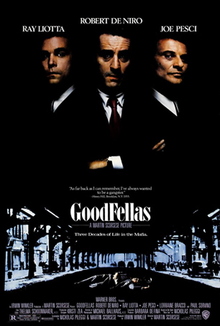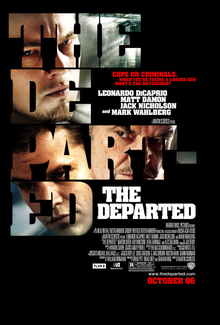Martin Scorsese is widely hailed as one of the great American directors, yet before I began this blog I had only seen three Scorsese films, and abnormal ones at that – The Last Waltz, No Direction Home, and The Aviator. I have never been particularly attracted by his films’ subject matter, which often tends toward the extremely and unpleasantly violent. But after seeing the astonishing work of filmmaking that is Raging Bull, I decided to catch up with three Scorsese classics. Taxi Driver, which has been called by some the best film of the 70s, is a psychological thriller from the point of view of a mentally unstable cab driver. Goodfellas is Scorsese’s widely praised drama about life in the mob over the course of three decades. And The Departed, the film for which Scorsese finally won an Oscar, is a crime drama about an Irish mob and corruption in the Boston police department.
Taxi Driver is the oldest of the three films, and certainly the most daring. Goodfellas and The Departed, for all their merits, are basically genre films, but Taxi Driver is a bold, unconventional portrait of a man losing his grip on reality. Robert DeNiro, in one of his most famous performances, plays Travis Bickle, a war veteran who is now a taxi driver in New York City. Suffering from insomnia, he spends his sleepless nights shuttling people across the city, always repulsed by what he sees. “All the animals come out at night,” Bickle declares, describing the whores, drug dealers, and addicts he sees every night. “Some day a real rain will come and wash all this scum off the streets. “ Bickle sees a glimpse of hope in his miserable life when he meets a beautiful young campaign worker (Cybil Shepherd), but their relationship soon backfires. He also gets involved in the life of a 12 year-old prostitute (Jodie Foster), whom he tries to save before it is too late. In the end, alienated by society, Bickle resorts to shocking violence.
When I sat down to watch Taxi Driver, I expected to see a violent revenge movie more than anything else. But the film is deeper than that. It is a contemplative, brooding film about loneliness and alienation. Everything is seen from Bickle’s perspective, and the driving scenes perfectly emphasize his isolation from the rest of society – separated by that little plastic window, mired in shadow, and ignored by his customers, we begin to understand Bickle’s frustration – although the film wisely never tries to explain Bickle’s actions. Rather, it relies on the strength of DeNiro’s performance, who makes the whole thing seem believable.
Yet for all its strengths, I cannot pretend that I walked away from Taxi Driver with any lasting impression, or real insight. There is nothing particularly wrong with the film – DeNiro’s performance is excellent, Bernard Herrmann’s eerie score is memorable, and the cinematography is remarkable. But for all of its efforts to delve into Bickle’s psyche, I never became invested in the character – I always remained emotionally aloof, like Bickle himself.
I was less impressed with Goodfellas, one of Scorsese’s most popular and critically acclaimed films. The film, as its tagline declares, depicts three decades of life in the Mafia. Henry Hill (Ray Liotta) grows up in the 50s in Brookyln, and as a teenager becomes attracted to the allure of Mafia life – the
 cars, the money, the privileges. Much to the concern of his parents, Henry begins working for the local family, led by Paulie Cicero (Paul Sorvino), and the notoriously violent Tommy DeVito (Joe Pesci) and Jimmy Conway (Robert DeNiro). Soon, Henry quits school and becomes part of the mob full time. Despite initial happiness, Henry’s lifestyle eventually leads him to a drug addiction, jail time, and an unhappy marriage, before he winds up in FBI Witness Protection limbo, where he still longs to return to the life of a “Goodfella.”
cars, the money, the privileges. Much to the concern of his parents, Henry begins working for the local family, led by Paulie Cicero (Paul Sorvino), and the notoriously violent Tommy DeVito (Joe Pesci) and Jimmy Conway (Robert DeNiro). Soon, Henry quits school and becomes part of the mob full time. Despite initial happiness, Henry’s lifestyle eventually leads him to a drug addiction, jail time, and an unhappy marriage, before he winds up in FBI Witness Protection limbo, where he still longs to return to the life of a “Goodfella.”Goodfellas has often been compared to The Godfather, but for me there is no comparison. I will concede that Goodfellas is no doubt the more realistic mob movie – for all of its artistry, The Godfather is somewhat romanticized, the violence buried under slick montages and swelling music. Scorsese doesn’t fall for that – the violence is frequent, graphic, sudden, and often quite shocking. His movie is certainly an accurate portrait of the Mafia in America, and the performances all ring true. The dialogue always seems realistic and spontaneous, never rehearsed. Scorsese also does a suitable job of depicting the allure of Mafia life. The early scenes are at times playful and fun, reflecting Henry’s naïve perspective on the Mafia. “We were treated like movie stars with muscle,” Henry’s narration tells us, “we had it all just for the asking.” This at first glorious life is depicted with great flair in a long tracking shot where Henry and a date skip the line at an expensive restaurant, make their way through the kitchen, and find their seats while everyone else is standing outside in the cold. Of course, Henry’s lifestyle soon backfires into a hopelessly violent and amoral one.
But after a while, it seems like that is all Goodfellas has to offer – a series of violent, unpleasant incidents. The film lacks any basic sense of humanity, like The Godfather had. None of the characters are relatable. None of the characters are remorseful. And the film lacks any sense of elegance or grace. That may seem an odd complaint for a Mafia movie, but compare it to Taxi Driver. Both films deal with violent, disturbing material, but Taxi Driver uses violence sparingly, and does have a certain elegance about it. Goodfellas is just coarse, and in the end Scorsese relies too heavily on gratuitous violence to make his point – and there doesn’t seem to be much of a point anyway.
 I will probably sound like a hypocrite for praising The Departed, because it suffers from many of the same flaws as Goodfellas – overlength, excessive violence, an over-reliance on four-letter words. But I found The Departed totally gripping from its first frame. The film begins with a narration by Irish mob boss Frank Costello (Jack Nicholson), who declares, “I don’t want to be a product of my environment. I want my environment to be a product of me.” In an opening prologue set to the Rolling Stones’ “Gimme Shelter,” Scorsese masterfully sets the scene, depicting Costello’s game – bribing kids off the streets of Boston, pulling them away from the Church and indoctrinating them into his mob. Flash forward many years later, and one such mobster, Colin Sullivan (Matt Damon) has become a mole in the Special Investigations Unit of the Massachusetts State Police. At the same time, the SIU sends its own mole, Billy Costigan (Leonardo DiCaprio) into Costello’s gang. Of course, both sides soon become aware of an intruder, and a bloody cat-and-mouse game ensues.
I will probably sound like a hypocrite for praising The Departed, because it suffers from many of the same flaws as Goodfellas – overlength, excessive violence, an over-reliance on four-letter words. But I found The Departed totally gripping from its first frame. The film begins with a narration by Irish mob boss Frank Costello (Jack Nicholson), who declares, “I don’t want to be a product of my environment. I want my environment to be a product of me.” In an opening prologue set to the Rolling Stones’ “Gimme Shelter,” Scorsese masterfully sets the scene, depicting Costello’s game – bribing kids off the streets of Boston, pulling them away from the Church and indoctrinating them into his mob. Flash forward many years later, and one such mobster, Colin Sullivan (Matt Damon) has become a mole in the Special Investigations Unit of the Massachusetts State Police. At the same time, the SIU sends its own mole, Billy Costigan (Leonardo DiCaprio) into Costello’s gang. Of course, both sides soon become aware of an intruder, and a bloody cat-and-mouse game ensues.As I mentioned earlier, The Departed is essentially a genre film, a basic crime story– Scorsese isn’t really experimenting here, he’s playing it safe with familiar material. But what a crime movie it is! The whole film crackles along at a galloping pace, propelled by strong performances. Part of the joy of watching The Departed is to see the giants of 70s cinema – actors like Jack Nicholson and Martin Sheen – matched with some of the most talented actors of today, like DiCaprio, Damon, and Mark Wahlberg. The cast is uniformly solid, particularly Nicholson, who is a genuinely frightening presence. The film also has a tremendous sense of location, making full use of its Boston setting. I was skeptical about The Departed – despite its Best Picture win, I had heard criticisms that it was excessively violent, warmed-over Scorsese. Yet all of these criticisms were trampled by the film’s narrative drive, and the sheer talent of all the players involved.
Taxi Driver: B+
GoodFellas: B
The Departed: A-
1 comment:
http://www.claremont.org/publications/crb/id.1477/article_detail.asp
Post a Comment